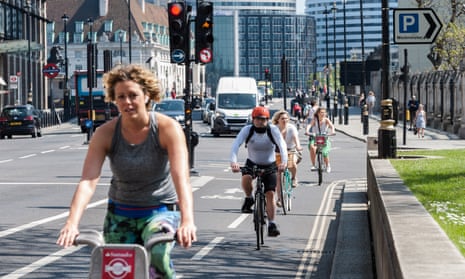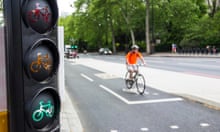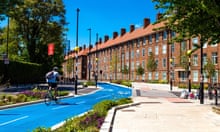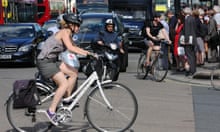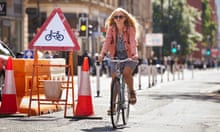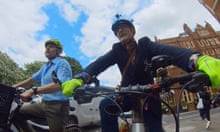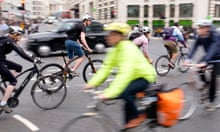There are few high street businesses reporting bumper trade in the coronavirus lockdown, but bicycle shops are selling out as soon as new stock is delivered and are swamped with demand to overhaul old bikes.
Big chains and independent cycle shops, which have been allowed to keep their doors open as an essential service while the rest of the high street is shut, admit they have been taken by surprise.
“It’s been the busiest period of trading I’ve had in 27 years,” said Andy Rackstraw, owner of Saddle Safari in south Buckinghamshire.
Rackstraw’s team has been working three shifts – including through the night – to cope with demand for new bike builds and maintenance jobs while ensuring physical distancing to keep staff safe. He has a waiting list of 300 repair jobs, and bike sales tripled in April compared with the same time last year.
“I’ve never experienced it like this,” said Steve Pettitt of Steve’s Cycles in Hull. “My repair jobs have doubled at least. People have been bringing bikes in that have been behind the garage for years.”
He said sales of kit such as helmets and saddles were also going well as parents took children out on the road. “You are actually seeing families out together,” he said.
A combination of quieter roads, more free time, good weather and, for many, the realisation that a cycle is their best option for getting to work in the coming months, prompted a surge of more than 50% in bike sales in April, according to early indications from a survey by the Bicycle Association trade body. It said seven out of 10 buyers are new or returning cyclists, a complete reversal to recent trends.
New bike sales on eBay tripled last month, and sales of secondhand machines were up 23% on the same time last year.
In the past month, shares in Halfords, the UK’s biggest cycle retailer, have shot up nearly 80%after the retail group said sales of bikes were double normal levels.
Wiggle, the online cycling and running retailer that has become a big player in the UK market, said its bikes sales in the UK had increased by 192% since the start of lockdown.
One independent retailer said his wholesale supplier had cleared its entire annual stock in four weeks.
Graham Stapleton, the chief executive of Halfords, said the buyers were not the usual “mamils” – middle-aged men in lycra. “We’ve seen a big growth in the number of female customers,” he said, “and younger, under-35s buying bikes.”
For years most of the growth in the market has come from expensive road bikes favoured by those “mamils”, while sales of commuter and family bikes have been pedestrian.
But in the past few weeks family and commuter-friendly hybrid bikes costing less than £1,000 have been racing out of stores. Halfords’ sales of hybrid bikes have doubled and demand for bikes via the government’s Cycle to Work discount scheme has soared. Electric bike sales have also accelerated as older people look for an alternative to public transport or a car.
Stapleton said Halfords still had bikes available and stocks were improving, but as a result of “unprecedented demand, which has been difficult to forecast” the chain had sold out of some under-£1,000 adult models, which meant “there is going to be short-term challenge with availability”.
He said Halfords had considered bringing in bikes by air, but this had proved too expensive, and the company was bringing in new stock from Turkey and Europe that could arrive faster than from its usual south-east Asian sources.
Several cycle retailers said stocks of cheaper adult bikes from key brands, including Trek, Specialized and Raleigh, had virtually run out across the country.
Kirsty Woodcock, head of UK marketing at Specialized, said there was no shortage of bikes, just delivery delaysas a result of the increased demand, and the company was working extra shifts at its UK warehouse to get more bikes out on the road.
There are also concerns about supplies of some cycle parts as a result of the demand to repair older bikes.
“There is most definitely a problem facing the trade at the moment and that’s supply issues,” said Paul Walker, owner of cycle parts and accessories distributor Hykeham Wholesale based in Lincoln.
Walker said he was struggling to source enough inner tubes after sales of some types soared 600% last month, while sales of bike helmets were up more than fivefold and cycle repair kits up 400% as families prepared to get out on the road.
“It’s gone absolutely crazy. I have done three months of sales in a month. It was really unexpected. It looks like this month will be similar – or it would be if I still had stocks to sell,” said Walker.
Weldtite, the Lincolnshire-based maker of cycle repair kits, is taking on 30% more staff and has set up temporary buildings to expand production as it struggles to cope with global demand. Cycling is being promoted worldwide as a way to get around with less risk of catching coronavirus.
But cycle retailers are unsure if the frenzy of interest will be a blip that could be wiped out as supplies of bikes dwindle over the summer and drivers return to their cars.
Hopes for lasting change in the UK got a boost when the transport secretary, Grant Shapps, unveiled a £2bn package “to put cycling and walking at the heart of our transport policy”. Transport for London has also unveiled plans for cycle-only roads and bridges in the capital to help Londoners avoid public transport.
The government has also said it will issue vouchers for hundreds of thousands of cycle repairs to help get an estimated 7m unused bicycles in the UK out of the shed. The Bicycle Association is hoping the UK will follow France’s example with vouchers worth £50 per person launching next month.
Stapleton said he thought the cycle boom would not trickle away: “I think some of this will continue. People need bikes to get to work because there isn’t any other option.”
Cycle to work schemes
Bike-to-work schemes are a popular way to buy a new bike, helmet and other accessories because they offer a saving of between 25% and 39%, with the cost simply deducted from an employee’s monthly pay.
Most companies of any size now offer this as a staff benefit. Employees who sign up are given a voucher which they take down to their local bike shop and use it to buy their chosen bicycle, plus other items such as lights or clothing.
The savings come through the fact that staff do not pay income tax or national insurance on the purchase price. In reality, your employer actually buys a bike for you, and you “hire” it back making a monthly payment from your gross (pre-tax) salary. At the end of the typical four-year contract it becomes yours after a final payment. Basic rate taxpayers – earning less than £50,000 a year – save a quarter on the bike and accessories’ cost. Higher rate taxpayers save even more.
Someone opting to buy a £500 commuting bike, a lock, a helmet and a waterproof jacket – spending £600 in total, would see their wages fall by around £34 a month for a year. That assumes they earn £30,000 a year. In total, they would save £150 over a normal purchase. A higher rate taxpayer would save £210 over the upfront £600 purchase.
Originally, there was a £1,000 limit on bike-scheme purchases, but this was scrapped to allow users to buy more expensive models.
